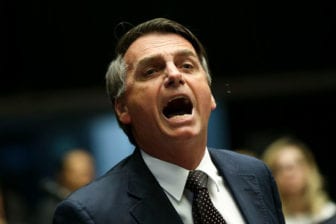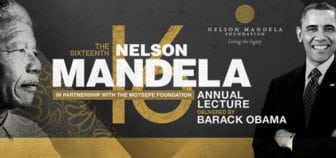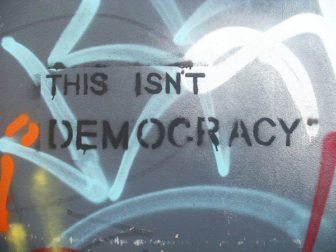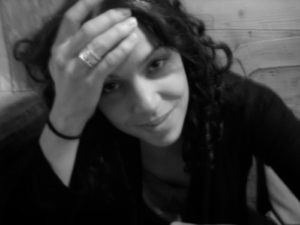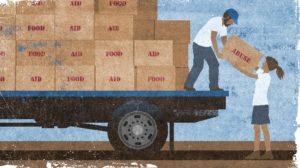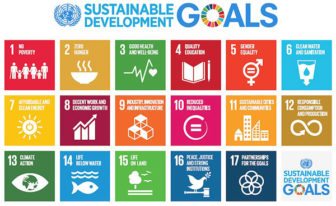July 5, 2016, The Guardian and Humanosphere
Dressed in white T-shirts, the women from the Venezuelan town of Ureña marched up to the barriers manned by members of the national guard. The guardsmen formed a cordon to prevent the women from passing but they eventually broke through, cheering as they ran across the bridge into the Colombian city of Cúcuta.
“The women of Ureña decided to come to the international bridge to cross the border because we don’t have food in our homes, our children are going hungry, there is a lot of need,” one woman told the Cúcuta daily La Opinion.
Venezuela is unraveling. With neither its economy nor its electricity supply diversified, the drop in oil prices is depleting Venezuela’s treasury and its drought (the worst in 40 years) is draining its power.
The economy is in free fall. Inflation is at more than 700%. The country “is making ‘surreal, suicidal’ debt payments.” More than 76 percent of the population lives in poverty. Venezuela is one of the few spots on earth where Coca-Cola does not produce or sell its products. Five hundred women just crossed the border into Colombia to buy essential goods because Venezuela can no longer import most of its food items. The water level in Venezuela’s Guri Dam plunged, threatening three-quarters of the nation’s electric grid. The country has one of the highest murder rates in the world (four times as high as in Afghanistan in 2015). In the view of most analysts, Venezuela is becoming a failed state, slipping into uncharted territory.
Parts of Venezuela, which because of its natural resources could have been one of the wealthiest and most advanced nations in the world, could be mistaken today for a post-war zone. Venezuela’s public health emergency is described this way:
Sign up for our free newsletters
Subscribe to NPQ's newsletters to have our top stories delivered directly to your inbox.
By signing up, you agree to our privacy policy and terms of use, and to receive messages from NPQ and our partners.
The day had begun with the usual hazards: chronic shortages of antibiotics, intravenous solutions, even food. Then a blackout swept over the city, shutting down the respirators in the maternity ward. Doctors kept ailing infants alive by pumping air into their lungs by hand for hours. By nightfall, four more newborns had died. “The death of a baby is our daily bread,” said Dr. Osleidy Camejo, a surgeon in the nation’s capital, Caracas, referring to the toll from Venezuela’s collapsing hospitals.
Why would a country with one of the largest fossil-fuel resources on Earth choose water as its primary energy supply? Not because of any commitment to renewable energy; it was to preserve as much of its oil as possible for export. In 2014, when NPQ examined the impact of former Venezuelan President Hugo Chávez’s death on Venezuela’s relationship with U.S.-based Citizen Energy Corporation, including that of Cities Service (CITGO), the U.S.-based subsidiary of the Venezuelan national oil company, no one could have predicted how bad Venezuela’s relationship with its people, let alone the world, would become.
Critics of President Nicolás Maduro blame Venezuela’s crisis on pervasive corruption and gross mismanagement. Supporters say an “economic war” against Venezuela’s socialist government is the cause. Luis Almagro, the Organization of American States’ (OAS) secretary general, produced this damning 132-page report that calls for the OAS to withdraw Venezuela’s membership. The report backs the demand made by the government’s opposition for a recall vote.
The nonprofit community in Venezuela is doing what it can to address the crisis. Caracas by Cesap (a Catholic Church organization) and the Bengoa Foundation (an NGO serving the nutritional needs of women and children) estimate more than 13 percent of the country’s population eats once or twice a day and the rate of malnutrition among children rose to 22.5 percent in 2015. Venezuela is beginning to witness massive hunger among people in extreme poverty, “and the economic crisis has created a new social segment—the “new poor”—to encompass those 34 percent of the country’s population who have recently slipped into poverty.”
Are there ways out of this economic and humanitarian crisis? Will Venezuela receive international financing from multilateral agencies? Is there a role for international humanitarian organizations to help meet the needs of the Venezuelan population? It will not be easy. Just a few weeks ago, President Madura accused the U.S. of plotting a coup and declared a state of emergency.
“You can hear the ice cracking. You know there’s a crisis coming. Our pressure on this isn’t going to resolve this issue,” said one U.S. official to Reuters.—James Schaffer


